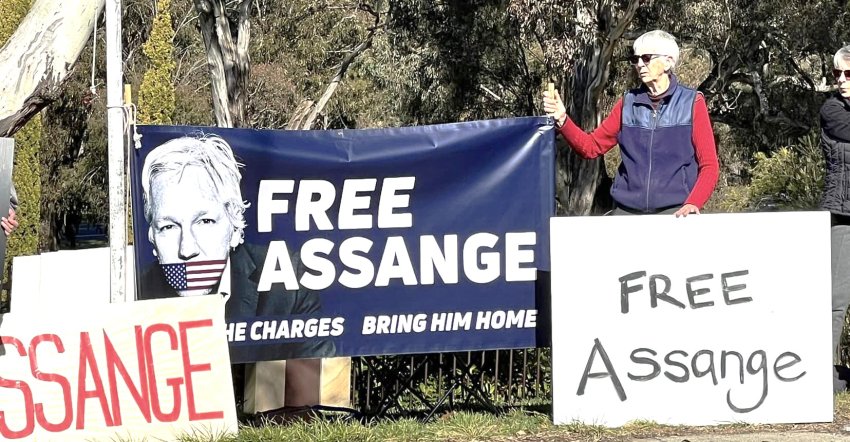
Six Australian MPs are heading to Washington ahead of Prime Minister Anthony Albanese’s October visit to test the waters, maybe even plant a few seeds of doubt, about why the indictment against Julian Assange should be dropped.
The indictment, an outrageous shambles of a document comprising 18 charges, 17 based on that brutish statute, the Espionage Act 1917, risks earning Assange a prison sentence of 175 years.
Assange’s incarceration remains ongoing, with Britain currently acting as prison warden and custodian.
In Australia, the icy polarisation that followed Assange’s initial publication — former Australian Prime Minister Julia Gillard was convinced Cablegate was a crime — has shifted to something more like a consensus.
The cynics will say that votes are in the offing, if not at risk, if nothing is done. The principled will argue that enlightenment has finally dawned.
Prime Minister Anthony Albanese and Opposition leader Peter Dutton agree on the fact that Assange has suffered enough.
The tireless work of Independent MP Andrew Wilkie inside parliament has bloomed into the Bring Julian Assange Home Parliamentary Group.
The Washington mission, which will arrive in the United States on September 20, comprises former Nationals leader Barnaby Joyce, Labor MP Tony Zappia, Greens Senators David Shoebridge and Peter Whish-Wilson, Liberal Senator Alex Antic and Independent MP Monique Ryan.
Shoebridge promised to make the case that Assange was merely telling the truth about US war crimes. Not wanting to give the impression he agreed with WikiLeaks, Joyce told the ABC that they were not in Washington “to pick a fight”.
They will argue that Assange had not committed any of the alleged offences as a US national or in the US. The material Assange published had not been appropriated by himself: he received it from Chelsea Manning, a US military source “who is now walking the streets as a free person”.
To pursue the indictment to its logical conclusion would mean that Assange, or any journalist, could be extradited to the US from, say, Australia.
Joyce noted that Beijing is pursuing four Chinese nationals on Australian soil for a number of alleged offences that did not, necessarily, have a nexus to Chinese territory. Should Australia now extradite them as a matter of course? The same observation has been made by Greg Barns, an adviser to the Assange campaign: “You’ve got China using the Assange case as a sort of moral equivalence argument.”
The delegation is hoping to draw attention to the nature of publishing itself and the risks posed to free speech and the journalistic craft by the indictment.
But there is another catch. In Shoebridge’s words, the delegates will also remind US lawmakers “that one of their closest allies sees the treatment of Julian Assange as a key indicator on the health of the bilateral relationship”.
Ryan expressed much the same view. “Australia is an excellent friend of the US and it’s not unreasonable to request to ask the US to cease this extradition attempt on Mr Assange.” The WikiLeaks founder was “a journalist; he should not be prosecuted for crimes against journalism.”
While these efforts are laudable, they are also revealing.
First, it shows that Albanese’s clout in Washington has been minimal. The government meekly awaits the legal process in Britain to exhaust itself, possibly leading to a plea deal with all its attendant dangers to Assange.
(The recent floating of that idea, based on remarks made by Caroline Kennedy, US ambassador to Australia, was scotched by former British diplomat and Assange confidante Craig Murray in an interview with WBAI radio recently.)
It’s best then to leave it to a diverse set of MPs to convey the message.
Then there is the issue of whether the delegation’s urgings will have any purchase beyond being a performing flea act.
US State Department officials remain glacial in their dismissal of Canberra’s “enough is enough” concerns and defer matters to the US Department of Justice.
Kennedy has been the perfect barometer: host Australian MPs for lunch, keep up appearances, listen politely and ignore their views.
Such is the relationship between lord and vassal.
In Washington, Assange is myth and monster. He is the hacker who pilfered state secrets and compromised US national security; the man who revealed confidential sources and endangered informants; and a propagandist who harmed the sweet sombre warriors of freedom by encouraging a new army of whistleblowers and transparency advocates.
Whatever the outcome of the cross-party trip, there is some glimmer of hope. In Australia, Assange is less being seen in the narrow context of personality, than for his set of principles. It has been his exposure of the crimes and misdeeds of power for which he is now being hounded and persecuted. It is all designed to chill global efforts to do something similar in the future.
[Binoy Kampmark lectures at RMIT University.]